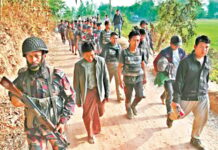By Amy Kazmin

Violence erupted in Bangladesh on Friday, in the second day of clashes after a senior Islamist political leader was sentenced to death for “crimes against humanity” committed during the country’s 1971 war of independence from Pakistan.
At least 52 people have been killed in unrest since Delwar Hossain Sayedee, a vice-president of the Islamist Jamaat-e-Islami party, was convicted of eight charges, including mass killing, rape and forcefully converting non-Muslims, during the conflict.
Following the ruling the Jamaat-e-Islami called on its supporters to converge on mosques on Friday, raising fears of further confrontation.
“We must stay alert. Jamaat and its allies are trying to plunge the nation into anarchy,” said Quamrul Islam, junior law minister. “We will not allow them to destroy democracy.”
Sayedee is the third member of the Jamaat-e-Islami to be convicted of war crimes in a tribunal that critics said was overtly partisan and had acted under pressure from Prime Minister Sheikh Hasina Wajed and her administration.
After the sentencing on Thursday, Sayedee’s supporters took to the streets where they clashed with police, and attacked government offices. They also clashed with government supporters who came out to celebrate the Islamist leader’s conviction.
Last month, Bangladesh’s government retroactively changed the law governing the war crimes tribunal to allow an appeals court to overturn the initial court ruling.
Bangladesh’s bloody 1971 war of independence from Pakistan – of which it was initially part, following the end of British colonial rule of the subcontinent – still haunts the impoverished Muslim-majority country.
The conflict divided the Bengali Muslim population of what was then East Pakistan between secular ethnic nationalists, who were upset that Bengali-speakers were being treated as second-class citizens in united Pakistan, and orthodox Muslims from the Jamaat-e-Islami, who supported the idea of a nation bound by a common religion.
Bangladesh says that during the brutal nine-month war, more than 3m people were killed and 200,000 women raped by the Pakistani army and their local collaborators. The conflict also sent millions of refugees spilling into neighbouring India to flee the brutality.
Overwhelmed with immediate challenges of meeting the basic needs of its citizens, the newly born nation did nothing to hold to account those responsible for the worst atrocities.
But in 2010, the government of Sheikh Hasina, whose father led the liberation struggle, set up a war-crimes tribunal to try those accused of the worst violence. Sayedee was accused of brutality while running a theological seminary.
However, the proceedings have been marred by repeated allegations of impropriety, interference and harassment of defence lawyers and the abduction of defence witnesses.
In December, Human Rights Watch, the US-based human rights monitor, called for Sayedee to be granted a fresh trial after the presiding judge of the three-member panel resigned after emails and audio tapes, documenting his inappropriate communications with the prosecution and the government, were leaked.
The resignation meant none of the three original judges, who began hearing the case in 2010, were still on the panel at the time the verdict was issued.
HRW has also criticised the Bangladeshi government for retroactively changing the war crimes tribunal law last month so that an appeals court could impose the death sentence on another convicted Jamaat-e-Islami leader, who was sentenced by the lower court to life imprisonment, rather than death.
Source: FInancial Tribune









